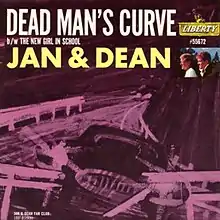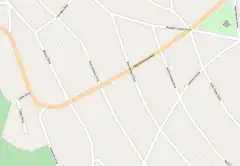| "Dead Man's Curve" | ||||
|---|---|---|---|---|
 | ||||
| Single by Jan and Dean | ||||
| from the album Drag City | ||||
| B-side | "The New Girl In School" | |||
| Released | December 4, 1963 (U.S.) | |||
| Recorded | November 27, 1963 | |||
| Genre | ||||
| Length | 2:57 | |||
| Label | Liberty | |||
| Songwriter(s) | Jan Berry, Roger Christian, Brian Wilson, Artie Kornfeld | |||
| Producer(s) | Jan Berry for Screen Gems, Inc. | |||
| Jan and Dean singles chronology | ||||
| ||||
"Dead Man's Curve" is a 1964 hit song by Jan and Dean whose lyrics detail a teen street race gone awry. It reached number eight on the Billboard Hot 100 singles chart and number 39 in Canada.[3] The song was written and composed by Brian Wilson, Artie Kornfeld, Roger Christian, and Jan Berry at Wilson's mother's house in Santa Monica. It was part of the teenage tragedy song phenomenon of that period, and one of the most popular such selections of all time. "Dead Man's Curve" was added to the Grammy Hall of Fame in 2008.[4]
Premise
The singer goes out for a leisurely drive one night in his Corvette Sting Ray, when a driver pulls up alongside in his Jaguar XKE and challenges him to a drag race. According to the song, the race starts at Sunset and Vine, traveling westbound on West Sunset Blvd., passing North La Brea Ave., North Crescent Heights Blvd., and North Doheny Dr. The original Schwab's Pharmacy was located just east of Crescent Heights on Sunset. The North Whittier Drive curve, a nearly 90° right turn traveling west on Sunset Boulevard just past North Whittier Drive, may have been the "dead man's curve" in the song,[5][6][7] but there is debate on the actual location of the curve.[8] Coincidentally, Jan Berry, of Jan and Dean, would himself later be involved in a near-fatal incident in 1966, when he crashed his own Sting Ray into a parked truck on North Whittier Drive near (but not on) Dead Man's Curve.[9]
The song ends with the singer relating his last memories of the ill-fated race to a doctor. Sound effects of screeching tires and crashing are also heard in the song. Deadman's Curve was used as the title for the 1978 biographical nationally televised movie about Jan and Dean,[8] starring Richard Hatch and Bruce Davison respectively portraying Berry and Torrence.
Versions

Three versions of "Dead Man's Curve" were released:
- Version #1: Original version from the 1963 Drag City album
- Version #2: Single "hit" version with added horns, strings, additional backing vocals, and sounds of a car skidding and crashing; from the 1964 Dead Man's Curve/The New Girl In School LP
- Version #3: An earlier rejected studio mix from the 1966 Filet of Soul album.
Live versions appear on the 1965 Command Performance and 1971 Anthology albums
There are a few minor lyrical differences between versions #1 and 3 and version #2 listed above:
- Versions #1 & 3 – "my frenched tail lights", "the strip was deserted", and "pulled her out and there I was"
- Version #2 – "my six tail lights", "the street was deserted", and "pulled her out and there we were"
There are two basic versions:[10]
Version one: Lead and backing vocals: Jan Berry Background vocals: Jan Berry, Brian Wilson, Gary Usher. Released: on Drag City LP, Liberty LST 7339, Jan and Dean Jan. 6, 1964 Side one, cut five – 3:01
Also on Filet of Soul LP, Liberty LST 7441, Jan and Dean, April 25, 1966, Side two, cut three – 3:01
Version two: Jan Berry, Roger Christian, Artie Kornfeld, Brian Wilson Jan Berry: Lead and backing vocals. Dean Torrence: Backing vocals Released February 17, 1964 Liberty 55672 45 RPM (B-side: "New Girl in School") – 2:28 (2:21 listing on actual disk—Wiki says 2:27) Released May 4, 1964 "Dead Man's Curve"/"The New Girl in School" LP Liberty LST 7361, Jan and Dean Side one, cut one – 2:28 Also re-released on several compilations (the 1984 Rhino LP Teenage Tragedies lists the song as a "re-recorded version"), anthologies, and 45 RPM records (some timed 2:39)
Cover versions
The song was covered by The Carpenters as part of their oldies sequence on their album Now & Then.
The B-side "The New Girl In School" was covered by Alex Chilton on his 1995 album, A Man Called Destruction.
The song was covered by the Belljars, whose version plays over the closing credits of the 1998 film, The Curve AKA Dead Man's Curve.
This song has also been covered by Cleveland proto-punk band electric eels, Blink-182, and Canadian musician Nash the Slash.
References
- ↑ Hoffmann, Frank W.; Bailey, William G. (1990). Arts & Entertainment Fads, Volume 1. Binghamton: Haworth Press. pp. 61–62. ISBN 9780866568814.
- ↑ Breihan, Tom (May 25, 2018). "The Number Ones: Jan And Dean's "Surf City"". Stereogum. Retrieved June 10, 2023.
...but they kept recording increasingly complex surf-pop jams, often with Wilson, for the next few years (1964's "Dead Man's Curve" is a banger).
- ↑ "CHUM Hit Parade - May 18, 1968".
- ↑ "GRAMMY HALL OF FAME". Grammy Awards.
- ↑ Staten, Vince (1990). Unauthorized America: a travel guide to the places the chamber of commerce won't tell you about. Perennial Library. p. 307. ISBN 0-06-096514-2.
The real Deadman's Curve is on Sunset Blvd. just west of Whittier Dr.
- ↑ Kelly, Michael Bryan (1993). Liberty Records: a history of the recording company and its stars, 1955-1971. McFarland & Company. p. 278. ISBN 0-89950-740-9.
... and went past the UCLA athletic fields; then he passed 'Deadman's Curve' and turned right on Whittier Drive.
- ↑ Sherwood, Rick (November 30, 1987). "By the Numbers". Calendar. Los Angeles Times. p. 2.
Whittier Drive near Sunset Boulevard in Beverly Hills: Jan & Dean's infamous "Deadman's Curve."
- 1 2 "Dead Man's Curve". snopes.com. 12 January 2010. Retrieved August 23, 2015.
- ↑ Borden, Jeff (October 30, 1988). "No Lies, Just tales of Demise Hearse-Drawn Tour of L.A. Travels. Trail of Star's Deaths". Travel. Los Angeles Times. p. 1F.
- ↑ Elliot, Brad (2013). Surf's Up!. Surf's Up Books. ISBN 978-0-9727686-1-0.